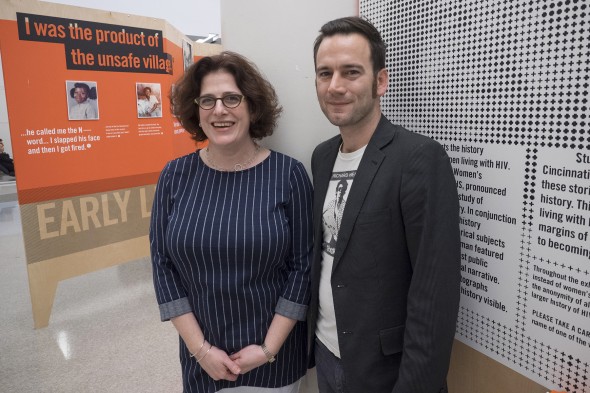Grant supports oral history project on HIV, AIDS

An exhibit inspired by “I’m Still Surviving,” is on view this week. “This project seeks to make women with HIV communicators of their history,” says project director Jennifer Brier, with graphic designer Matt Wizinsky — Photo: Jay Yocis
UIC has received a grant in support of an oral history project featuring women’s personal histories of living with HIV and AIDS in the United States.
The $70,000, one-year grant from the MAC AIDS Fund will expand “I’m Still Surviving,” a pilot program developed by the UIC-based History Moves project and the Women’s Interagency HIV Study (WIHS), a 23-year-old clinical research study of women living with HIV.
In 2014, History Moves and WIHS paired participants to interview each other and share their histories. They also worked with the women to collect personal items to accompany their narratives and develop a public exhibition, book and film.
With the grant, the Chicago-based initiative will expand to include women living with HIV/AIDS in Chapel Hill, North Carolina, and Brooklyn, New York.
Jennifer Brier, the project’s director, says expanding the program geographically will help to highlight critical subjects related to HIV/AIDS in diverse female populations, as well as social and health care inequities.
“Their histories, when coupled with the narratives we have collected in Chicago, promise to expose new narratives about women and HIV in the 21st century that center women’s experiences of physical and mental health, racial and economic segregation over the course of their lifetime, and barriers they face to comprehensive care,” said Brier, associate professor and director of gender and women’s studies.
“In Plain Sight: A Women’s History of HIV/AIDS in Chicago,” an exhibition inspired by “I’m Still Surviving,” is on view through April 2 at Pop Up JUST Art Center, 1255 S. Halsted St.
Future goals of “I’m Still Surviving” include a new curriculum for medical and nursing students to learn about the connection between social and physical health through the public history of women with HIV; and HIV/AIDS public engagement and awareness campaign in underserved neighborhoods.
Brier, a historian who studies the intersection of gender, race and sexuality, says the stories and exhibition presented via the pilot program merge the history of the HIV/AIDS epidemic into the history of Chicago.
“The stories often share similar themes of heartbreak and courage, loss and pain, and tales of redemption, determination, and spirit,” she said. “This project seeks to make women with HIV communicators of their history.”
